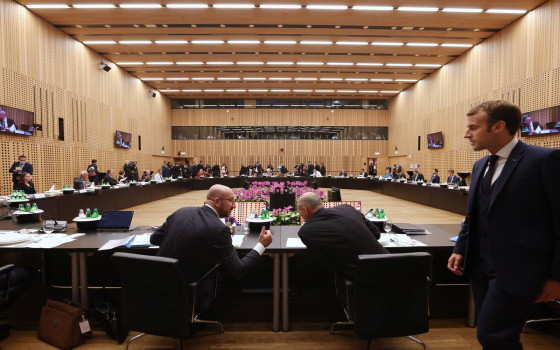
The situation in Gaza and Lebanon tops the agenda of the Brussels summit, along with the files of Ukraine, migration and competitiveness

- Europe and Arabs
- Thursday , 17 October 2024 12:33 PM GMT
Brussels: Europe and the Arabs
EU leaders meet in Brussels today and tomorrow for a summit that will address a number of international and regional issues, including Ukraine, the Middle East, competitiveness, migration and foreign affairs.
Ukraine
EU leaders will discuss Russia's war of aggression against Ukraine in all its dimensions, including developments on the front line, and continued comprehensive support for Ukraine and its people. The European Union is committed to a just and lasting peace in Ukraine, based on the principles of the UN Charter and international law.
With regard to military support, leaders will review progress made in the delivery of air defense systems, ammunition and missiles, as well as assistance measures under the European Peace Facility and bilateral assistance from EU Member States. According to what was issued by the EU institutions in Brussels before the start of the summit this afternoon,
They will also discuss progress made in using the exceptional proceeds from Russia's frozen assets for the benefit of Ukraine.
To help Ukraine prepare for winter and beyond, leaders will discuss how to strengthen Ukraine's energy sector and vital infrastructure, which have been the target of continuous bombing by Russia.
The EU stands ready to increase pressure on Russia, including by ensuring full and effective implementation of sanctions and through other measures to counter their circumvention.
EU response to Russia’s war of aggression against Ukraine (Background information)
Middle East
EU leaders will discuss the latest developments in the Middle East, in particular the dangerous escalation of violence in the region.
The EU condemns in the strongest terms Iran’s attack on Israel and urges all parties to exercise maximum restraint and respect international humanitarian law. The EU is fully committed to reducing tensions and contributing to de-escalation in order to avoid a serious regional conflict.
The deadly spiral of escalation in the Middle East must stop now. A regional war is in no one’s interest, European Council President Charles Michel previously stated.
In this context, EU leaders will discuss the most urgent needs, including:
An immediate ceasefire along the withdrawal line on the Lebanese-Israeli border (“Blue Line”) to end all cross-border threats
Support for Lebanese state institutions and the Lebanese Armed Forces
An immediate ceasefire in Gaza and the deployment of urgent humanitarian assistance
The unconditional release of all hostages
The leaders are also expected to discuss the escalation in the West Bank following the recent military operation, the increase in settler violence and the expansion of illegal settlements, as well as the security situation in the Red Sea.
The EU is committed to a lasting and sustainable peace based on the two-state solution between Israel and an independent, democratic, contiguous, sovereign and viable Palestine.
Competitiveness
The EU is determined to strengthen its long-term competitiveness and improve the economic and social well-being of citizens. As set out in the Strategic Agenda 2024-2029, EU leaders have identified several priorities to reduce dependence on strategic sectors and make Europe an industrial and technological powerhouse.
At the special European Council meeting on 17-18 April 2024, EU leaders also agreed on the need for a new competition agreement and set out some means to achieve it. In this context, leaders will review progress made in strengthening the EU’s competitiveness. The reports “More than a market” by Enrico Letta and “The future of European competitiveness” by Mario Draghi will feed into the leaders’ discussions. Special European Council, 17-18 April 2024
Migration
EU leaders will hold an in-depth discussion on migration and review the implementation of the comprehensive approach to migration, agreed at the Special European Council on 9 February 2023. In this context, they will focus on:
External action
Strengthening control of the EU’s external borders
Increasing and accelerating returns
Combating the exploitation of migrants, human trafficking and smuggling
European Chapter
EU leaders are expected to endorse country-specific recommendations, thus concluding the 2024 session.
Climate change and biodiversity
The European Council will assess preparations for the meetings of the UN Biodiversity Conference in Cali, Colombia, from 21 October to 1 November 2024, and the UN Climate Change Conference (COP29) in Baku, Azerbaijan, from 11 to 22 November 2024.
Foreign affairs
In light of events, EU leaders may address specific foreign policy issues, including developments in Georgia, Moldova, Venezuela and Sudan.












No Comments Found